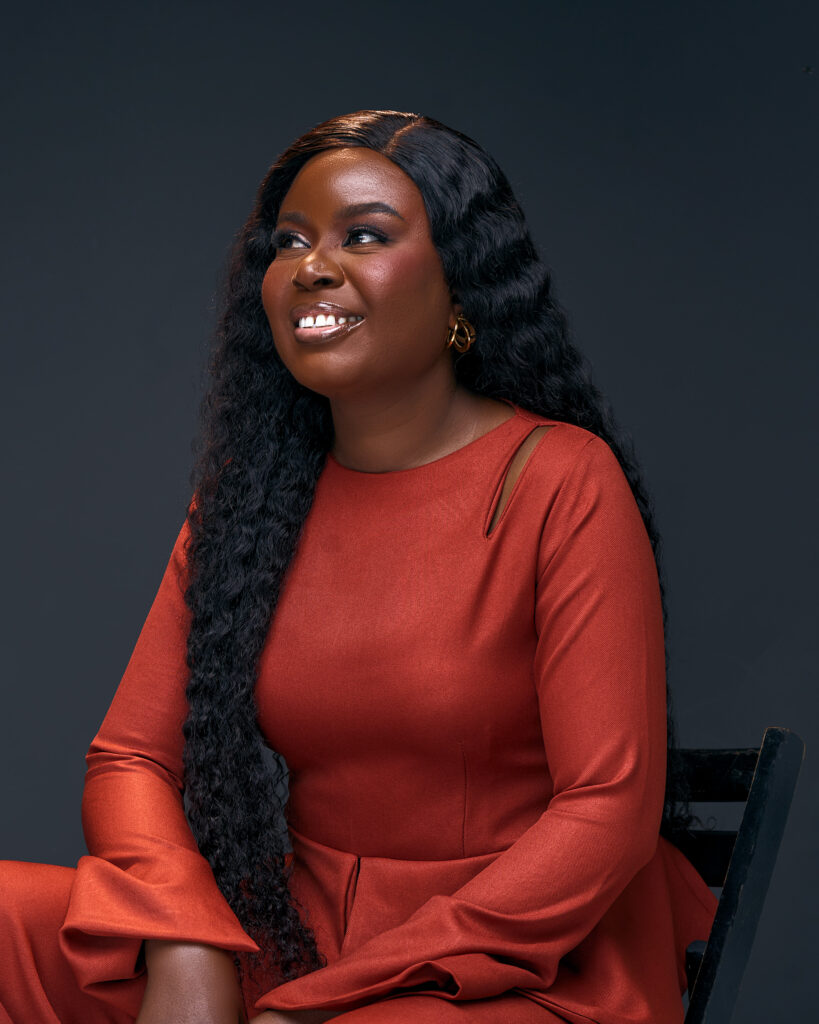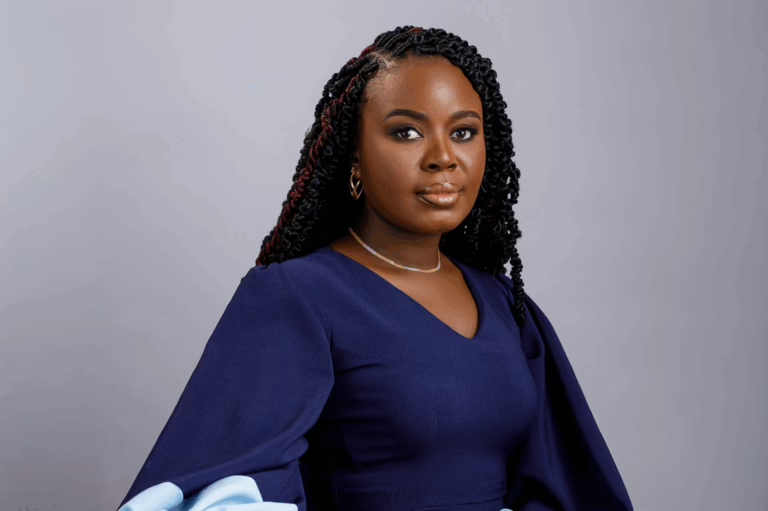Every hero has a purpose. For Omotayo Inakoju, that purpose is safeguarding Nollywood-one contract, one copyright, and one filmmaker at a time. While many filmmakers might overlook the legal details, she recognizes that securing copyrights, contracts, and clear chains of title is essential to preserving their creative legacy. Her mission is straightforward yet impactful: to ensure that today’s films remain profitable, protected, and enduring for years ahead.
Omotayo’s journey into film law was shaped by a blend of rebellion and serendipity. Despite excelling in science, her father, a practicing attorney, hoped she would pursue medicine. “He once took me to my science class to drop my desk, but I quietly moved it back to the arts classroom without protest,” she shares with a smile.
This subtle act set her on the path to law school. Later, during her master’s studies in Lagos, a friend at Silverbird introduced her to the film industry. “I began learning about film distribution and exhibition, and I realized that mastering the entire film business chain would establish me as a specialist in this niche,” she explains.
Unlike many entertainment lawyers who primarily focus on music, Omotayo identified a void in film law. “I rarely encountered anyone branding themselves as a film lawyer. There was a gap that needed attention, and I was well-positioned to fill it,” she notes. This choice has since defined her career, making her one of Nollywood’s rare dedicated film attorneys-serving as an educator, protector, and collaborator for filmmakers.
Beyond legal offices, Omotayo is also recognized for her engaging Instagram content, where she simplifies complex legal concepts into accessible advice for both emerging and seasoned filmmakers. By demystifying the law, she has become a visible champion for Nollywood’s sustainable future.
In this edition of Off Camera, Omotayo Inakoju shares insights on running a legally sound film enterprise, the critical role of copyright in cinema, and how she fosters trust with creatives who often view lawyers as barriers.
Did you ever envision yourself creating films instead of legally protecting them? Do you still feel drawn to writing, directing, or producing?
My passion has always been about safeguarding creators’ work. I appreciate the blend of creativity, resources, and finances that go into even a short film. That understanding fuels my dedication. I’ve never felt compelled to make films myself. Perhaps someday I might executive-produce or invest, but for now, my focus remains on defending intellectual property and investments. I do write, but strictly for educational purposes rather than creative storytelling.
Film law is a niche few law students encounter. What challenges did you face establishing yourself in this field, and how did you gain trust in an industry often unaware of its legal needs?
My entry into film law was accidental, but once I recognized the opportunity, I intentionally carved out my space. I spent six years at Silverbird mastering distribution and exhibition, then expanded my knowledge to production. I engaged producers, requested contract templates, and studied agreements. By the time EbonyLife came along, I was prepared. While music and entertainment lawyers were common, film lawyers were scarce. I chose to fill that void.
Many associate film law solely with contracts. Could you explain its full scope-from development to distribution-and share an example where legal advice transformed a project’s trajectory?
Film law is often mistaken as just contract drafting, but contracts are merely tools to define responsibilities, reduce risks, and protect intellectual property. Since filmmaking centers on IP, legal considerations extend beyond paperwork. For instance, deciding whether to register your company as an LLC or create a special purpose vehicle for each project affects personal liability.
Contracts are needed with writers, financiers, and actors. Permits are essential for outdoor shoots, especially in Lagos. Insurance is crucial to cover accidents or data loss. Script clearance helps identify defamation, trademark conflicts, or character names already protected. For example, a well-known director once had to rename a Netflix film due to trademark infringement.
Additionally, censorship compliance, distribution agreements, and licensing deals with streaming platforms form part of the legal chain. I recall a case where a producer nearly used a trademarked character name; timely intervention prevented a costly lawsuit. Another involved financiers mistakenly believing their investment granted them copyright ownership, which I had to clarify.

Copyright is often an unseen thread holding films together. What are common misunderstandings filmmakers have about copyright, and how do these misconceptions cause problems later?
Copyright forms the foundation of filmmaking. It grants financial rights-such as monetization, licensing, distribution, and sales-as well as moral rights, including credit attribution and protection against misuse. A widespread myth is that paying for a work automatically transfers copyright ownership. In reality, the creator retains copyright until it is formally assigned.
Another misconception is that registration is unnecessary because copyright is automatic. While protection begins upon creation, registering with the Nigerian Copyright Commission provides official certification, legal evidence, and public acknowledgment.
Many also believe copyright lasts indefinitely. It does not. For scripts, protection extends for the author’s lifetime plus 70 years; for films, it lasts 50 years post-release. That’s why I advise filmmakers to register their scripts separately from their films to maximize protection.
Ideas in film are elusive. Legally, what distinguishes ‘owning’ an idea from owning a completed screenplay or film?
Ideas themselves are intangible and cannot be legally protected-they are free for anyone to use. Protection only applies once an idea is fixed in a tangible form, such as a written script or recorded footage. Without this, even if multiple people share the same concept, there’s no legal claim. This encourages creators to bring ideas to life. That’s why two creators can tell similar stories but produce distinct, protected works-one as a novel, another as a film.
Streaming has revolutionized film financing and consumption. What new legal challenges arise as global platforms acquire African films, and are our laws evolving quickly enough?
Streaming platforms have expanded distribution opportunities that were once limited. However, they introduce complexities. Platforms often demand global exclusivity, which can restrict producers if the service lacks presence in certain markets. Strategic negotiations might involve granting regional rights to different platforms.
Revenue models differ too. Cinemas typically share weekly box office receipts, whereas streamers usually pay a one-time licensing fee, often in installments. They also require a clean chain of title-clear agreements with actors, music rights, and editing permissions. This pushes producers to adopt more rigorous structures, which is positive. Yet, the streaming landscape remains somewhat unregulated and unpredictable. Hopefully, legislation will soon align with these industry shifts.
Filmmakers often view lawyers as gatekeepers who limit creativity. How do you build rapport so creatives see you as an ally rather than a barrier?
Lawyers frequently get a bad reputation, not just in film but across sectors. My approach is to think like a filmmaker and investor, not just a legal professional. I present contracts as tools for protection-clarifying rights, avoiding disputes, and safeguarding their investments and intellectual property.
I also emphasize future-proofing their projects. For example, trademarking a film title or character enables expansion into series or merchandise without risking brand dilution. When creatives realize I’m aligned with their goals of profitability and brand protection, they begin to see me as a partner rather than an obstacle.
For emerging filmmakers with limited budgets, what is the one essential contract or legal step they must never overlook, even if they can’t afford a full-time lawyer?
There’s no universal answer-it depends on the project. However, fundamental agreements include contracts with writers, financiers (if applicable), actors, location owners, editors, and soundtrack providers, as well as distribution deals. Importantly, filmmakers should seek lawyers familiar with the film industry. Contracts involve negotiation, and a lawyer unfamiliar with filmmaking cannot effectively manage rights, risks, or liabilities.
That’s why I advise against asking a relative who specializes in unrelated fields like oil and gas law. Instead, find a legal expert who understands the nuances of film.
If you could step into the shoes of any filmmaker for a single project, whose career would you want to experience firsthand, and why?
I would choose Mo Abudu. She is undeniably one of Nigeria’s leading film executives, consistently elevating our industry on the global stage. She presents African stories not merely as narratives of hardship but as vibrant, culturally rich tales. I’d love to witness how she manages large budgets and collaborates with top-tier creatives.


















0 Comments